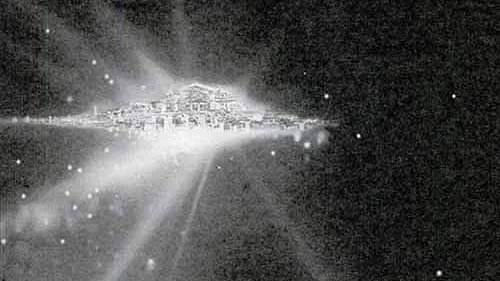It’s an eternal symbol of comfort and hope for billions of people around the world.
But what is heaven, and where is it in relation to our universe?
In the Bible, heaven is described as a realm in the skies above Earth, where ultimate peace and joy can be found under the presence of God.
And in popular culture, it has long been depicted with pearly gates, fluffy clouds and bright, celestial lights.
‘Most of us have some concept of heaven, even if it is one formed by movies like What Dreams May Come, The Lovely Bones, or think it involves meeting Morgan Freeman in a white room,’ said Robyn J. Whitaker, senior lecturer at the University of Divinity in .
Photos of deep space have also raised hopes that we might be able to spot heaven way above our heads.
For example, NASA titled one of its photos of Saturn as ‘Blue Heaven’, while the European Space Agency dubbed a distant nebula a ‘Stairway to Heaven’.
However, according to Professor Whitaker, the truth is that heaven is a ‘utopian vision’.

In 1994, reports circulated than the Hubble Space Telescope snapped a photo of a brilliant celestial city on the edge of the universe – purportedly heaven

In the Bible, heaven is described as a place of ultimate peace and joy under the presence of God, a realm in the skies above earth. And in popular culture, it has long been depicted with pearly gates, fluffy clouds and bright, celestial lights (file photo)
For Christians, the idea of the dead being in heaven or enjoying paradise often brings comfort to the bereaved and hope to those suffering or dying.
But in the Christian faith, heaven was originally more about where God lived, not about humanity’s ultimate destination if they live a righteous life.
N.T. Wright, professor of New Testament and Early Christianity at the University of St Andrews, said the way people now talk about heaven is ‘deeply unbiblical and misleading’.
‘Basically the whole western tradition took a wrong turn in imagining that the aim of the game was ‘to go to heaven when we die’,’ he told .
‘The whole Bible is about the God of heaven coming to make his home with us – in Jesus and then in the Holy Spirit.’
Lari Launonen, philosopher at University of Helsinki in Finland, said many theologians don’t like the word ‘heaven’ as it ‘evokes the idea of an ethereal reality with souls hovering around’.
‘The Bible actually describes a renewed, physical world – one where we have resurrection bodies, just as Jesus did after rising from the dead,’ he told .
Famously, at the start of the Bible in the Book of Genesis, we are told that heaven is created by God along with the Earth.

Peter Jackson’s 2009 film The Lovely Bones tells the story of a murdered girl (played by Saoirse Ronan) who watches over her family from heaven

Heaven and Earth are united in the 15th century painting ‘The Assumption of the Virgin’ by Italian artist Francesco Botticini
This contradicts the theory of the Big Bang generally accepted by scientists, where the universe exploded into existence from a single minute point.
Bible authors imagined Earth to be flat, with the realm of the dead below us and a dome over the Earth that separates it from the heavens.
Of course, we know the Earth is not flat and this ‘three-tiered universe makes no sense to a modern mind’, according to Robyn J. Whitaker, senior lecturer at the University of Divinity in
But it helped cement the theory that heaven is in the stars, viewable from Earth – one that continues to circulate in the modern era.
In 1994, news circulated that the Hubble Space Telescope snapped a photo of a brilliant celestial city on the edge of the universe – purportedly heaven.
However, the report in Weekly World News – a US tabloid known for fictional stories – and the black-and-white image was easily unravelled as a hoax.
Still, the wondrousness of the cosmos returned by deep space telescopes such as James Webb inspire belief in some kind of divinity out there.
Although there is zero evidence that heaven is anywhere within our universe, there are earthly locations that at least resemble it.

The HD 44179 nebula, known as the ‘Red Rectangle’ has been compared to a ‘stairway to heaven’ by the European Space Agency

In Saturn’s bluish north, day ends for the dreamy white clouds that stretch here into twilight. NASA titled this photo, snapped in 2007, ‘My Blue Heaven’
Comment now
In the Bible, the Garden of Eden – where Adam and Eve reside before being expelled – is the earthly paradise that most closely resembles heaven.
And the Garden of Eden is ‘strikingly’ similar’ to real-life Persian Royal gardens (paridaida) which date back as far as 4000 BC, according to Professor Whitaker.
These gardens of Old Iranian origin were rectangular or symmetrical in design and filled with walled enclosures, water fountains and fruit-bearing trees.
The oldest Persian garden of which there are records belonged to Cyrus the Great, in his capital at Pasargadae, now a World Heritage site to the northeast of Shiraz, Iran.
More recently-built Persian gardens that still stand include Eram Garden in Shiraz, thought to date back to the 12th century.
It is these remarkable sites that will perhaps be as close as we can get to witnessing heaven on Earth.
‘Heaven or paradise in the Bible is a utopian vision, designed not only to inspire faith in God but also in the hope that people might embody the values of love and reconciliation in this world,’ Professor Whitaker said in a prior piece for The Conversation.
Of course, the existence of heaven outside of our universe entirely depends on your own belief system and who seek guidance from.

The oldest Persian garden of which there are records belonged to Cyrus the Great, in his capital at Pasargadae, now a World Heritage site to the northeast of Shiraz, Iran

Eram Garden, a historic Persian garden in Shiraz, Iran, though to date back to the 12th century. The oldest Persian garden of which there are records belonged to Cyrus the Great, in his capital at Pasargadae, now a World Heritage site to the north of Shiraz, Iran
Professor Stephen Hawking, the English physicist who died in 2018, didn’t believe in God or a creator and called heaven ‘a fairy story’.
Read More
'It began with blinding light': Man claims he died for six minutes and saw what happens after death

‘I regard the brain as a computer which will stop working when its components fail,’ Professor Hawking told the Guardian in 2011.
‘There is no heaven or afterlife for broken down computers; that is a fairy story for people afraid of the dark.’
Dr Launonen – who studies whether scientific explanations of religious beliefs are compatible with a religious worldview – ‘wrestled with thoughts’ about the afterlife when his three-year-old son died from a rare disease called mucolipidosis.
‘Cognitive science of religion suggests that our minds are naturally wired to believe in immaterial minds or souls that survive the death of the body,’ he told .
‘Some fields of study suggest there are good reasons to believe in life after death.
‘Historians have found evidence for the historicity Jesus’ resurrection, while research on near-death experiences suggests that conscious experience may not end in death.’
According to one theory, the fact we have all gone from non-existence (before conception and birth) to existing (life) means we could exist in one form or another after death.
But whether or not this existence would resemble traditional representations of the afterlife – heaven or indeed hell – remains to be seen.

